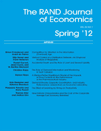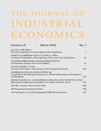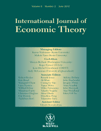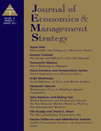
RAND JOURNAL OF ECONOMICS
Scope & Guideline
Advancing Economic Understanding Through Rigorous Analysis
Introduction
Aims and Scopes
- Economic Theory and Applications:
The journal publishes research that explores and develops economic theories, particularly in the context of real-world applications such as market behavior, competition, and strategic decision-making. - Empirical Analysis:
A significant focus is placed on empirical studies that utilize data to validate theoretical models, investigate economic phenomena, and inform policy decisions. - Market Structures and Dynamics:
Research on various market structures, including oligopolies, monopolies, and competitive markets, is prevalent, emphasizing the dynamics of pricing, product differentiation, and strategic interactions among firms. - Behavioral Economics and Decision-Making:
The journal explores how psychological factors and bounded rationality influence economic decision-making, including topics such as consumer behavior, search behavior, and strategic communication. - Public Policy and Regulation:
There is a consistent emphasis on the implications of economic research for public policy, focusing on areas such as healthcare, environmental policy, and regulatory frameworks.
Trending and Emerging
- Data-Driven Economics:
An increasing number of studies are utilizing big data analytics and machine learning techniques to gain insights into economic behavior, market dynamics, and consumer preferences. - Behavioral Insights in Economics:
There is a growing interest in incorporating behavioral economics into research, examining how cognitive biases and social influences affect decision-making in various economic contexts. - Platform Economics and Digital Markets:
Research focusing on the economics of digital platforms, including issues of competition, market power, and user behavior, is on the rise as these markets become increasingly central to the economy. - Sustainability and Environmental Economics:
Emerging themes include the economic implications of sustainability practices, environmental regulations, and the impact of climate change on market structures and consumer behavior. - Health Economics and Policy Design:
Health economics is gaining prominence, particularly in the context of policy design, healthcare markets, and the impact of regulatory changes on health outcomes and economic efficiency.
Declining or Waning
- Traditional Market Models:
Research centered around traditional models of market competition, such as perfect competition, has seen a decline as newer, more complex models incorporating behavioral and strategic elements gain prominence. - Simple Pricing Strategies:
Studies focusing solely on basic pricing strategies without considering the influence of consumer behavior or market dynamics have become less frequent, as the field shifts towards more nuanced analyses. - Static Analysis without Learning Dynamics:
There is a notable reduction in papers that conduct static analyses of market scenarios, as dynamic models incorporating learning, adaptation, and evolving strategies have become more favored. - Single-Factor Explanations of Market Behavior:
Research that relies on single-factor explanations for market behavior is waning, with a trend towards multi-faceted analyses that consider various interacting elements. - Labor Economics in Isolation:
The focus on labor economics as a standalone area is declining, as interdisciplinary approaches that integrate labor economics with other economic domains are becoming more prevalent.
Similar Journals

JOURNAL OF INDUSTRIAL ECONOMICS
Advancing insights in industrial economics.Welcome to the Journal of Industrial Economics, a premier academic publication dedicated to advancing the field of industrial economics through rigorous research and scholarly discourse. Published by Wiley, this esteemed journal has been a vital resource since its inception in 1978, offering insights into market structures, firm behavior, and regulatory frameworks. With its impact reflected in the 2023 quartiles, the journal stands prominently in Q1 in Business, Management and Accounting and Q2 in both Accounting and Economics and Econometrics. Researchers and scholars will find the journal’s rich repository of articles invaluable for understanding complex economic phenomena, while its strategic focus on empirical evidence encourages interdisciplinary collaboration. Despite its subscription-based model, the journal ensures widespread access to its vital contributions to the field, making it integral for both current and aspiring professionals eager to navigate the intricacies of industrial economics. Explore cutting-edge research and join a community dedicated to scholarly excellence at the Journal of Industrial Economics.

Indian Journal of Economics and Development
Navigating the Complexities of Economic GrowthIndian Journal of Economics and Development, published by SOC ECONOMICS & DEVELOPMENT, stands as a noteworthy platform for scholarly discourse in the fields of economics, business management, and development studies. With an ISSN of 2277-5412 and an E-ISSN of 2322-0430, this journal, based in Ludhiana, India, has been dedicated to advancing research and dialogue since its inception in 2019 and is poised for convergence until 2024. Although currently ranked in the Q4 categories across various disciplines in Business, Management and Accounting, Economics and Econometrics, and Geography, Planning and Development, the journal’s commitment to fostering impactful research is evident in its wide-ranging aims and scope, which seek to explore contemporary economic challenges and developmental issues. While the journal operates without an open-access model, it provides a valuable resource for academics and professionals, and encourages contributions that address both theoretical and empirical questions. Researchers, students, and professionals will find this journal critical as it serves a vital role in the dialogue surrounding economic and developmental dynamics, particularly in an increasingly complex global landscape.

International Journal of Economic Theory
Navigating the forefront of theoretical economic analysis.International Journal of Economic Theory, published by Wiley, serves as a vital platform for scholars and researchers in the fields of economics and econometrics. With its ISSN 1742-7355 and E-ISSN 1742-7363, this journal focuses on advancing theoretical understandings in economics, providing a comprehensive analysis of contemporary economic issues. The journal has been converging knowledge and innovation since its inception in 2009 and continues to sustain a commitment to high-quality research until 2024. As a Q3 journal in the 2023 category rankings, it ranks in the 21st percentile in Scopus for Economics and Econometrics, reflecting its established presence amidst competitive scholarly discourse. Although it is not open access, the journal is widely accessible through institutional subscriptions, facilitating learning and research for professionals, graduate students, and academic leaders. The International Journal of Economic Theory is pivotal for those looking to contribute to economic thought, ensuring that emerging theories find a respected outlet in the global academic landscape.

Journal of Agricultural and Applied Economics
Unlocking potential through rigorous peer-reviewed research.The Journal of Agricultural and Applied Economics, published by Cambridge University Press, stands as a leading platform for disseminating innovative research in the fields of agriculture, economics, and applied sciences. With an impressive impact factor and a prestigious Q1 ranking in Agricultural and Biological Sciences and Q2 in Economics, this journal is recognized for its rigorous peer-reviewed content that addresses contemporary challenges in agricultural and economic policies. Since its transition to Open Access in 2015, it has widened its reach, allowing scholars, practitioners, and students unrestricted access to vital research findings. The journal's scope encompasses a wide array of topics, fostering interdisciplinary dialogue and offering insights essential for informed decision-making in the agricultural sector. Addressing critical issues from food security to sustainable practices, the Journal of Agricultural and Applied Economics is instrumental for anyone seeking to contribute to the advancement of knowledge in these pivotal areas.

JOURNAL OF ECONOMICS & MANAGEMENT STRATEGY
Unlocking insights for strategic decision-making in a dynamic world.JOURNAL OF ECONOMICS & MANAGEMENT STRATEGY, published by Wiley, is a premier academic journal dedicated to advancing research in the interdisciplinary fields of economics, management, and strategic decision-making. Established in 1992 and continuing through 2024, the journal has garnered a reputation for critical analysis and innovative ideas, achieving a prestigious Q1 ranking in Business, Management and Accounting, alongside reputable Q2 rankings in Economics and Econometrics, Management of Technology and Innovation, and Strategy and Management categories. With an ISSN of 1058-6407 and an E-ISSN of 1530-9134, it serves as an essential resource for researchers, professionals, and students keen on exploring the latest trends and empirical studies impacting the fields of management and economic strategy. Although it does not currently offer open access, the journal’s rigorous peer-review process ensures that only high-quality research is published, providing valuable insights that shape real-world practices. Located in the United Kingdom and serving a global audience, this journal plays a vital role in fostering dialogue between academia and industry, highlighting its significance in the ever-evolving landscape of business strategy.

ECONOMIC THEORY
Advancing the Frontiers of Economic ThoughtECONOMIC THEORY is a leading academic journal published by Springer, dedicated to advancing the field of economics through the dissemination of innovative and high-quality research. Established in 1991, this journal has become a crucial resource for researchers, professionals, and students interested in theoretical economics and econometrics. With a strong reputation, it ranks in the Q1 category for Economics and Econometrics as of 2023, exemplifying its influence and contribution to the discourse in the field. The journal operates without Open Access options, ensuring that all published content undergoes rigorous peer-review, maintaining scholarly integrity. Scholars can access the journal's rich compendium of articles that delve into diverse economic theories, providing invaluable insights and fostering academic dialogue. Headquartered in Germany, ECONOMIC THEORY is committed to shaping the future of economic research and serving as a cornerstone in the academic community.

Theoretical Economics
Catalyzing Dialogue in the World of Economic TheoryTheoretical Economics, published by the Econometric Society, is a premier open-access journal dedicated to advancing the field of economics through rigorous theoretical analysis. With an ISSN of 1933-6837 and an E-ISSN of 1555-7561, this journal has been at the forefront of economic scholarship since its inception. Operating out of New York University, it holds a prestigious Q1 ranking in the category of Economics, Econometrics, and Finance, reflecting its influential contributions to the discipline. By making research freely accessible since 2006, Theoretical Economics not only fosters a broader dissemination of knowledge but also promotes collaborative dialogue among economists worldwide. The journal's convergence years span from 2007 to 2024, ensuring ongoing relevance in a rapidly evolving field. Researchers, professionals, and students alike will find Theoretical Economics an essential resource for staying informed about cutting-edge theoretical advancements in economics.

GAMES AND ECONOMIC BEHAVIOR
Illuminating the Pathways of Economic Decision-MakingGAMES AND ECONOMIC BEHAVIOR, published by Academic Press Inc Elsevier Science, is a premier journal in the fields of economics and finance, with an impact factor that strongly reflects its esteemed position in academia. Established in 1989 and converging through to 2024, this journal delves into the intricate relationships between strategic interactions and economic behavior, making it a pivotal resource for researchers, professionals, and students alike. As a Q1 journal in both Economics and Econometrics and Finance, it maintains rigorous standards that attract high-quality research and theoretical advancements. Although it currently does not offer open access options, the journal's wealth of articles and findings continues to contribute significantly to the discourse surrounding economic strategies, decision-making processes, and market behavior. For those seeking to deepen their understanding of the economic implications of games and their behavioral aspects, GAMES AND ECONOMIC BEHAVIOR remains an essential academic resource.

SOCIAL CHOICE AND WELFARE
Transforming Ideas into Impactful ResearchSOCIAL CHOICE AND WELFARE is a prestigious academic journal published by Springer, dedicated to advancing the field of social choice theory and welfare economics. With its foundation dating back to 1984, the journal has made significant contributions to theoretical and applied research, becoming a leading platform for the dissemination of innovative ideas. It holds an impressive categorization in 2023, ranking in Q2 for Economics and Econometrics and Q1 for miscellaneous Social Sciences, reflecting its dual impact across these vital disciplines. The journal's Scopus ranking further highlights its influence, situated within the 57th percentile in Social Sciences (miscellaneous) and the 34th percentile in Economics, Econometrics, and Finance. Researchers, professionals, and students can access a wealth of knowledge without open access barriers, as it combines rigorous peer-reviewed articles with important theoretical developments. Its contribution to understanding societal preferences and resource allocation makes it an essential read for those engaged in economic and social research.

Review of Network Economics
Shaping the conversation in econometrics and network theory.Review of Network Economics is a distinguished journal published by Walter de Gruyter GmbH, specializing in the fields of economics and econometrics. Established in 2010, this journal has emerged as a pivotal platform for disseminating innovative research and critical insights pertaining to network economics, including its applications in finance and social sciences. Although currently listed in the Q4 quartile in the category of Economics and Econometrics with Scopus ranking 587 out of 716, the journal aims to foster academic discourse and facilitate the exploration of new methodologies and theoretical frameworks that shape current understanding in the field. With its commitment to openness and accessibility, the journal also provides authors with opportunities for sharing their findings globally, despite the absence of specific open access options. As industry professionals, researchers, and students continue to navigate complex economic landscapes, Review of Network Economics serves as an essential resource for the latest methodologies, case studies, and theoretical advancements in network analysis.